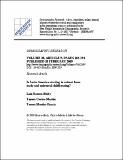Por favor, use este identificador para citar o enlazar a este item:
http://hdl.handle.net/10261/23609COMPARTIR / EXPORTAR:
 SHARE SHARE
 CORE
BASE CORE
BASE
|
|
| Visualizar otros formatos: MARC | Dublin Core | RDF | ORE | MODS | METS | DIDL | DATACITE | |

| Campo DC | Valor | Lengua/Idioma |
|---|---|---|
| dc.contributor.author | Rosero-Bixby, Luis | es_ES |
| dc.contributor.author | Castro Martín, Teresa | es_ES |
| dc.contributor.author | Martín García, Teresa | es_ES |
| dc.date.accessioned | 2010-04-27T15:25:22Z | - |
| dc.date.available | 2010-04-27T15:25:22Z | - |
| dc.date.issued | 2009 | - |
| dc.identifier.citation | Demographic Research 20: 169-194 (2009) | es_ES |
| dc.identifier.issn | 1435-9871 | - |
| dc.identifier.uri | http://hdl.handle.net/10261/23609 | - |
| dc.description | Este artículo está sujeto a una licencia CC BY 3.0 | es_ES |
| dc.description.abstract | The 2000 censuses show that the proportion of women below age 30 who are mothers has dropped substantially in most Latin America countries, suggesting that the social imperative of early motherhood, which has long prevailed in the region, is weakening. Surveys conducted in 14 Latin American countries in 2006 also show a strong link between childlessness and higher education across several cohorts. We discuss whether the recent increase in childlessness among young women reflects a shift towards later childbearing, a novel trend in the Latin American context, and also whether it may signal an emerging retreat from universal childbearing in the region. | es_ES |
| dc.description.sponsorship | The Wellcome Trust Foundation (grant WT072406), the Spanish Ministry of Education and Science (grant SEJ2006-03485) and an UCR-CSIC scientific cooperation agreement supported in part this research. | es_ES |
| dc.format.extent | 656151 bytes | - |
| dc.format.mimetype | application/pdf | - |
| dc.language.iso | eng | es_ES |
| dc.publisher | Max Planck Institute for Demographic Research | es_ES |
| dc.relation | info:eu-repo/grantAgreement/MEC//SEJ2006-03485/ES/FAMILIAS AL MARGEN DEL MATRIMONIO: UN ANALISIS SOCIODEMOGRAFICO DE LA CRECIENTE DISOCIACION ENTRE SEXO, VIDA EN PAREJA, MATRIMONIO Y REPRODUCCION/ | es_ES |
| dc.relation.isversionof | Publisher's version | es_ES |
| dc.rights | openAccess | es_ES |
| dc.subject | Childlessness | es_ES |
| dc.subject | Fertility | es_ES |
| dc.subject | First birth | es_ES |
| dc.subject | Latin American | es_ES |
| dc.title | Is Latin America Starting to Retreat from Early and Universal Childbearing? | es_ES |
| dc.type | artículo | es_ES |
| dc.identifier.doi | 10.4054/DemRes.2009.20.9 | - |
| dc.description.peerreviewed | Peer reviewed | es_ES |
| dc.relation.publisherversion | http://www.demographic-research.org/volumes/vol20/9/ | es_ES |
| dc.relation.publisherversion | https://dx.doi.org/10.4054/DemRes.2009.20.9 | es_ES |
| dc.rights.license | https://creativecommons.org/licenses/by/3.0 | es_ES |
| dc.contributor.funder | Ministerio de Educación y Ciencia (España) | es_ES |
| dc.relation.csic | Sí | es_ES |
| dc.contributor.orcid | Rosero-Bixby, Luis [0000-0002-3063-3111] | es_ES |
| dc.contributor.orcid | Martín García, Teresa [0000-0002-0274-5765] | es_ES |
| dc.contributor.orcid | Castro Martín, Teresa [0000-0002-7791-9977] | es_ES |
| dc.type.coar | http://purl.org/coar/resource_type/c_6501 | es_ES |
| item.openairetype | artículo | - |
| item.grantfulltext | open | - |
| item.cerifentitytype | Publications | - |
| item.openairecristype | http://purl.org/coar/resource_type/c_18cf | - |
| item.fulltext | With Fulltext | - |
| item.languageiso639-1 | en | - |
| Aparece en las colecciones: | (CCHS-IEGD) Artículos | |
Ficheros en este ítem:
| Fichero | Descripción | Tamaño | Formato | |
|---|---|---|---|---|
| DemographicRes_2009.pdf | 640,77 kB | Adobe PDF |  Visualizar/Abrir |
CORE Recommender
SCOPUSTM
Citations
48
checked on 12-abr-2024
WEB OF SCIENCETM
Citations
47
checked on 23-feb-2024
Page view(s)
450
checked on 19-abr-2024
Download(s)
272
checked on 19-abr-2024
Google ScholarTM
Check
Altmetric
Altmetric
Este item está licenciado bajo una Licencia Creative Commons

